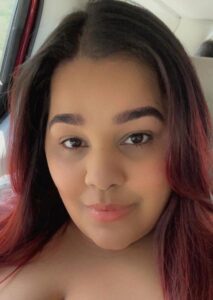 When you’re a social worker in the child welfare system, you’re expected to be “everything to everyone” and the specific role depends on the case. Sometimes, I’m coordinating medical needs. Other times, I’m representing children and their families in court. Or I’m acting as a therapist. Or a mediator. Or even a parent.
When you’re a social worker in the child welfare system, you’re expected to be “everything to everyone” and the specific role depends on the case. Sometimes, I’m coordinating medical needs. Other times, I’m representing children and their families in court. Or I’m acting as a therapist. Or a mediator. Or even a parent.
There are about 2,000 child protection caseworkers in Florida who wear different hats every day as they dedicate their careers to helping families and neighbors in need. It’s not an easy vocation. But for those who are driven by a passion to help others, there’s nothing so rewarding.
I was led down this career path because social work combined two key interests for me: kids and psychology. I graduated from UCF in 2021 and started my career helping adults in crisis find housing and employment before joining One Hope United earlier this year.
For case managers like me, working in the field of child welfare and foster care allows us to use every aspect of our social work training. We’re not just working with adults; we’re getting involved with the entire family to make sure kids are growing up in safe home environments. That’s always our priority: How can we help families get what they need – mental health care, addiction recovery, stable housing and so on – so they can care for their children?
Sometimes, we need to make tough calls. If a child is living in a situation where they’re at risk of physical or mental harm, medical neglect or other unhealthy situations, it’s up to us to get them into temporary foster care. When that happens, we’re also responsible for assessing the available options and working toward family rehabilitation and/or reunification. Adoption is only considered if reunification is not possible.
It’s a lot of responsibility, and it can be overwhelming at times. But what keeps me going is the knowledge that we can change lives for the better.
In one case, I worked with a person who had urgent medical needs, doctor’s appointments and surgery on the horizon. Until I took the case, none of those needs were getting met – but together, we were able to make a plan and check off each box, one by one. When you’re a doctor, you’re saving lives through medicine. When you’re a social worker, you’re saving lives by getting people access to medical care.
On a different occasion, I was working with a group of siblings who were used to being “in the system.” The Department of Children and Families had always been in and out of their lives, and I wasn’t the first case manager or social worker who had tried to help them. They felt like they couldn’t rely on anyone; they felt no one would take the time to listen to their thoughts and feelings.
Gradually, I was able to break through the distrust and connect with them. I still remember what the oldest child said to me: “You actually care. You’re the first one who’s bothered to listen to us and believe what we have to say.”
Sometimes, I ask myself, “Am I doing the best I can?” But it’s moments like these that remind me we’re changing lives with the best intention, no matter how small it seems.
At the end of the day, social workers aren’t miracle workers. We’re just people. We want what’s best for the children and families, but there are a lot of things in our line of work that are unpredictable, frustrating, and slow to change. All we can do is find the joy in the good days, get through the bad days, and do our best to make a difference along the way.
What my work has taught me is that, even in an imperfect system, there’s room for everyone to make a difference. It takes all kinds of people – not only social workers, but foster parents, adoptive families, counselors, volunteers, mentors and more – to build a better future for Florida’s children. To find out more about how you can get involved, visit www.embracefamilies.org.
Carina Espinal is a Family Case Manager at One Hope United, a private human service organization that works side-by-side with Embrace Families, the lead nonprofit agency overseeing child welfare in Orange, Osceola and Seminole counties.


